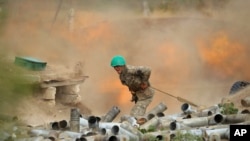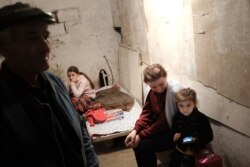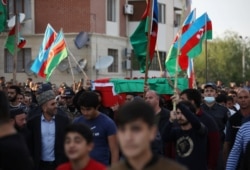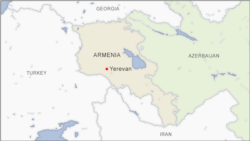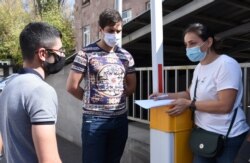Armenia and Azerbaijan have accused one another of using Syrian fighters in the conflict over the disputed Nagorno-Karabakh enclave. The use of foreign fighters, analysts warn, could be a serious escalation, threatening wider regional repercussions.
Armenia's ambassador to Moscow, Vardan Toghanyan, on Monday accused Turkey of sending 4,000 Syrian fighters from northern Syria to bolster Azeri forces seeking to recapture the Nagorno-Karabakh enclave. Dozens have been killed and hundreds wounded since fighting erupted Sunday.
The enclave is inside Azerbaijan but is run by ethnic Armenians, who seized control in a bloody war in the 1990s. Russia is historically an ally of Armenia and maintains military bases there but has sought to maintain good relations with Azerbaijan. Russia sells both countries weapons and armaments. Azerbaijan is a crucial ally of Turkey, whose president, Recep Tayyip Erdogan, is strongly backing Baku’s efforts to recapture Nagorno-Karabakh.
Azerbaijan has dismissed Armenian accusations over the use of Syrian fighters. "We consider such claims as complete nonsense and baseless information," said Hikmat Hajiyev, a presidential adviser and head of Azerbaijan's foreign affairs department, in a briefing Tuesday to foreign journalists in Turkey.
"Why should Azerbaijan bring someone else to solve its problem in Azerbaijan? We have enough armed personnel. This is a piece of [Armenian] propaganda," added Hajiyev.
But Yerevan’s claims are supported by a Reuters news agency report and other international news publications, which published interviews Monday with Syrian rebels who said they were being deployed to Azerbaijan in coordination with Ankara.
One of the rebels interviewed by Reuters said nearly 1,000 Syrian fighters had already been sent to Azerbaijan.
Turkish armed forces in Syria currently protect the rebels’ last enclaves there. Turkish government officials, when approached over Yerevan's claims, declined to comment.
Ankara has used Syrian rebels in its military intervention into the Libyan civil war. The rebels were sent to support Prime Minister Fayez al-Sarraj and his Government of National Accord in its fight against the forces of General Khalifa Haftar, who backs a parallel administration in eastern Libya.
"Judging that Turkey has used the same Syrian battalions in Libya, I find these reports credible, this what we [Turkey] do," said analyst Atilla Yesilada of Global Source Partners.
"Thousands [of Syrian rebels] were sent to Libya; they were paid about $1,200 a month. Two things were critical in turning the tide in Libya for Sarraj’s forces - Syrian fighters and Turkish drones."
But Zaur Gasimov, an expert in Turkish-Russian affairs at Germany's Bonn University, questions whether Turkey would risk such a dangerous move.
"I heavily doubt that the Syrian rebels would be used in Azerbaijan. That would not be tolerated by Russia and Iran and is seemingly not needed by Azerbaijan at this initial stage of warfare."
Moscow and Tehran view the Syrian rebels as terrorists because of their links to jihadi groups. Gasimov says with Russia and Iran bordering the conflict zone, any Syrian deployment would be viewed as an existential threat.
"Moscow would not tolerate any penetration of Sunni mercenaries in its borderland, because they would fear the eventual penetration into predominantly Sunni Dagestan and Chechnya [both Russian states]. The same goes to Iran that is attentively observing the situation," said Gasimov.
Russian forces have fought a decades-long war against radical Islamist Sunni groups in Chechnya and Dagestan. Iran also fears Sunni jihadis, which it accuses of carrying out a number of terror attacks in its territory.
But some analysts suggest Turkey could be seeking to exploit Russian fears.
Ankara and Moscow have deepened their relationship, cooperating in Syria despite backing rival sides in that country’s civil war. But Yesilada says the recent stepping up of attacks by the Russian-backed Syrian government against Syria’s Idlib rebel enclave puts strains on Russian-Turkish ties.
"I don't think [Russian President Vladimir] Putin and Erdogan are as close as they used to be," said Yesilada. "Erdogan wants Putin to know he can hurt him as much as he can hurt him and perhaps wants to leverage the Azerbaijan issue to extract some concessions in Syria."
Meanwhile, Azerbaijan’s presidential adviser, Hajiyev, Tuesday accused Yerevan of using Lebanese and Syrian ethnic Armenians in the fighting over Nagorno-Karabakh. "We have some information they [Yerevan is] also in close contact with some terrorist groups in the Middle East and are trying to transport such groups to Armenia."
Hajiyev did not provide any evidence to substantiate his accusations. Yerevan has not so far responded to the charges. Ankara made similar accusations on Monday.
"Armenia should cease its attacks immediately and send back the mercenaries and terrorists it brought from abroad," Turkish Defense Minister Hulusi Akar said Monday.
There is precedent for ethnic Armenians to be involved in the Nagorno-Karabakh conflict.
“During the war [from] 1988-94, Armenian Lebanese ‘Fedayieen,’ (an armed guerrilla group) backed [Nagorno]-Karabakhi Armenians," said Gasimov.
The war killed an estimated 30,000 people. The last major effort at establishing peace collapsed in 2010.




